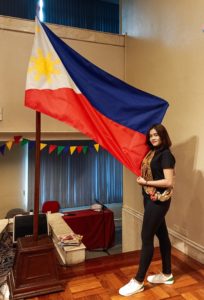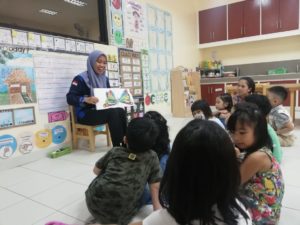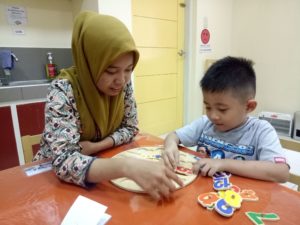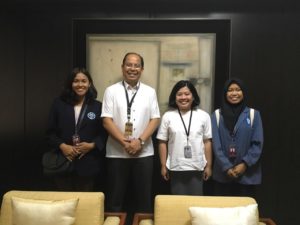Cindy and Hasna came to the Philippines to train for the ideal setup of teaching little children: meeting them face-to-face inside a classroom, providing them with interactive activities to awaken their creativity, and boosting their self-confidence with a warm hug or a star stamp on the back of their hands. The two Indonesian lasses spent one month in UA&P last year teaching the tots of Child Development and Education (CDE) Center, becoming its first foreign interns.
Six months after their return to Indonesia, however, that country was hit by COVID-19.
Read on and find out how new teachers like them who prepared for the ideal but woke up to the new normal face up to the challenges brought by online learning.
Cindy
Angela Cindy Aurelia was on her fourth year in the Faculty of Education at the State University of Malang Indonesia when she joined the SEA Teacher Project* Batch 8. She chose to come to the Philippines because she thinks that, since the country is similar to Indonesia in many ways, she can adapt easily. More than that, however, UA&P offers her specialization: Early Childhood Education.
“It really caught my interest, and I’m so lucky because UA&P provided me with everything I needed, especially a place to stay. Thanks to my coordinators—Teacher Lexie, Ms. Kat, and Teacher Nina—I was able to visit some places here in Metro Manila. We also visited some schools for observation.”

Cindy loved her internship in the CDE Center, especially when she got involved in the “Buwan ng Wika” celebration. She was thankful also for the other opportunities that UA&P offered her.
“I had the chance to sit in class and listen to the lectures of the professors. I felt very proud whenever I introduced myself in front of the class as a student delegate from Indonesia. I was so happy when Dr. Lagos invited me to share and describe my country’s culture.”
At present, the 23-year-old works as a teacher to kindergarten class level for children 4 to 6 years old. The pandemic, however, has hit East Java hard (where the city of Malang is), recording the highest number of mortality among the country’s provinces. Schools are closed and classes are now conducted online, even among the students of Cindy. She knows, however, how difficult it is for young children to study at home.
“The teachers sent the learning kit and materials to the parents. We tried to do an online class with the toddler level, but the children could neither follow nor focus. I think online classes are not enough for early childhood education levels because we have to develop the social and emotional skills of these children. They need social interaction with teachers and friends in a class, which is not possible for now.”
Thus, Cindy and her fellow teachers supplement online learning with face-to-face home visits and class visits, following health protocol. They ask the permission of the parents if they can personally deliver the learning materials to the children’s home, giving the teachers the opportunity to visit their students at home once a month. The children have also been tasked to go to school once a week. Only three children per class are allowed on a given day.
Teachers count a lot on the support of the parents. Cindy said, “We give parents some tips on how to teach their children at home during online learning. We build good communication with them and involve them in our home programs. We send them observation sheets so that they can write down their children’s development. Afterward, they return to us the observation report.”
Cindy hopes that everything would get better soon so that more student teachers will benefit from the overseas internship where she participated.
“When the pandemic is over, I will tell others to do their internship in the Philippines, especially in the University of Asia and the Pacific, because they won’t regret it.”

Hasna
Hasna Dewi was also on her fourth year in the Faculty of Teacher Training and Education at the State University of Borneo Tarakan when she came to the Philippines to do her internship for her specialization in primary school education.
“I did not have any difficulties in my internship in UA&P because my coordinators—Teacher Lexie, Ms. Kat, and Teacher Nina—and all the teachers at the CDE Center were there to help me when I needed to learn about something. I had fun teaching at the CDE Center. I also enjoyed attending classes with other UA&P students.”


Hasna, now 23, works as a grade 1 teacher in a public elementary school. Before classes shifted online, her school conducted seminars to help the teachers prepare for the new mode of teaching and learning. Her school also evaluates how online learning can be made more interesting for children.
“At first, the students were happy with these online classes,” Hasna narrated. “They were very enthusiastic about sending photos and videos of their activities. But after almost a month, they admitted that they missed going back to school. Enthusiasm for learning began to decline.”
Hasna and her fellow teachers had to think of ways to enthuse their students to learn. One of the things they started doing is to meet the students online every day instead of every week, even briefly, just to greet them. The children are excited because they can see their teacher’s face and hear the latter’s voice every day.
The teachers also asked the support of the parents in observing and recording their child’s learning process in the form of videos or photos of the children’s work, which are then sent to the teacher online.
“In my opinion, the success of these children in learning online can be seen in the success of the activities that are carried out at home with the parents’ help. If the teachers can choose only light materials that have clear and achievable learning objectives, and if they establish good communication with parents so that parents can accompany their children while the latter are studying at home, I think online learning can be successful.”
Hasna said that she would highly recommend UA&P to other Indonesian students who will do their internship. “I was amazed by the kind of service they extended to me. It was perfect from my arrival to my return.”


*The SEA Teacher Project is a pre-service student teacher exchange in Southeast Asia organized by the Southeast Asian Ministers of Education Organization (SEAMEO). The project aims to enable pre-service teachers to develop their teaching skills and pedagogy, practice their English skills, gain a broader regional and world view, and be exposed to diverse teaching and learning situations and opportunities and to the value of flexibility.
Banner photo by Ryan Wallace on Unsplash.
Leave a Reply